IFNA Overview
The Initiative for Food and Nutrition Security in Africa (IFNA) was launched at the 6th Tokyo International Conference on African Development (TICAD VI) in 2016, in response to growing international momentum to improve nutrition.
In response to the situation of malnutrition in Africa and the growing international momentum for improving nutrition, IFNA’s mission is to promote concrete initiatives at the field level to improve nutrition by deepening collaboration between African countries and partners.
IFNA has formed a Steering Committee (SC) with 10 international organizations.
Report
A report consolidating and reviewing ten years of IFNA’s activities and achievements has been published.
Member organizations of IFNA
- African Development Bank (AfDB)
- African Union Development Agency New Partnership for Africa's Development (AUDA-NEPAD)
- Food and Agriculture Organization (FAO) of the United Nations
- International Fund for Agricultural Development (IFAD)
- Japan International Cooperation Agency (JICA)
- Japan International Research Center for Agricultural Sciences (JIRCAS)
- United Nations Children's Fund (UNICEF)
- World Bank (WB)
- United Nations World Food Programme (WFP)
- World Health Organization (WHO)
Related Links
Nutrition Challenges
Malnutrition is a deficiency, excess, or imbalance in energy or nutrient intake. A "double burden of malnutrition" occurs, where the problem of "undernutrition" and the problem of "overnutrition," where too much nutrition causes health problems, coexist. (Recently, micronutrient deficiencies have been referred to as the triple burden of malnutrition.)
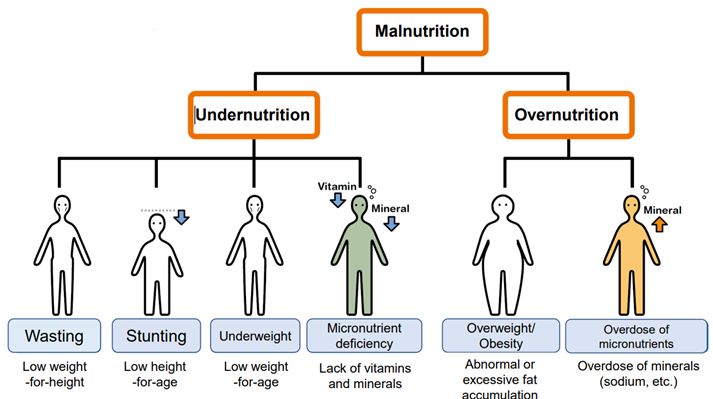
TICAD and the Nutrition Summit
2016 TICAD VI @ Nairobi
The Initiative for Food and Nutrition (IFNA) was launched in collaboration with the African Union Development Agency (AUDA-NEPAD) and the "IFNA Declaration" was adopted.
2019 TICAD VII @ Yokohama
The IFNA Yokohama Declaration 2019 was adopted, declaring the "IFNA All-Africa Deployment" to expand the experience of the initial participating countries (10 countries) to all of Africa in order to improve nutrition for 200 million children.
2021 Tokyo Nutrition Summit (N4G) 2021
The Nutrition Summit is a Nutrition for Growth (N4G) initiative launched during the London 2012 Olympic and Paralympic Games to address global nutrition improvement on the occasion of the global sports festival.
The Tokyo Nutrition Summit, hosted by the Japanese government as the host country of the Tokyo Olympics and Paralympics, adopted the Tokyo Nutrition Declaration, and JICA presented the JICA Nutrition Declaration
, a set of ten principles for nutrition, at an official side event.
Two approaches to improving nutrition
IFNA will emphasize two methods for improving nutrition: the Nutrition-focused Food Access Improvement Approach and Multi-Sectoral Collaboration.
1) Nutrient-focused Food Access Improvement Approach (NFA Approach)
Visualize nutrients in the current diet and recommend, nutrition crops to grow and foods to consume to fill nutrient gaps identified leading to awareness and agriculture sector interventions .
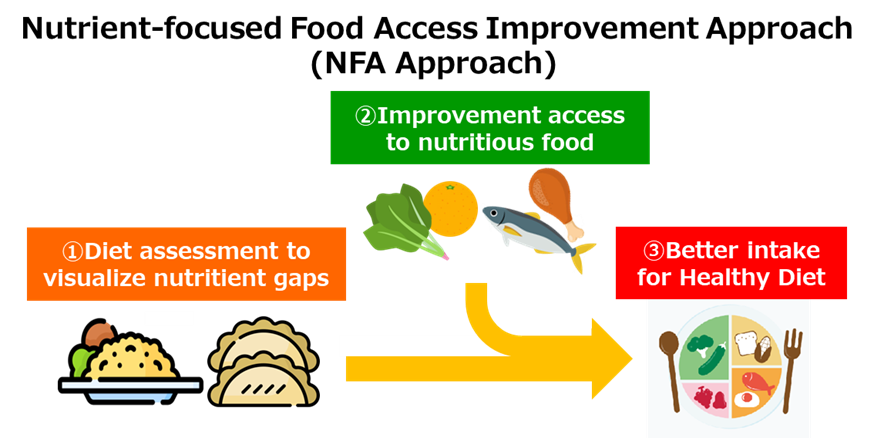
2) Multi-sectoral Collaboration ( Multi-sectoral Collaboration)
A cross-sectoral approach, in which diverse sectors (health, agriculture, water and sanitation, and education) related to the various causes of malnutrition work together.
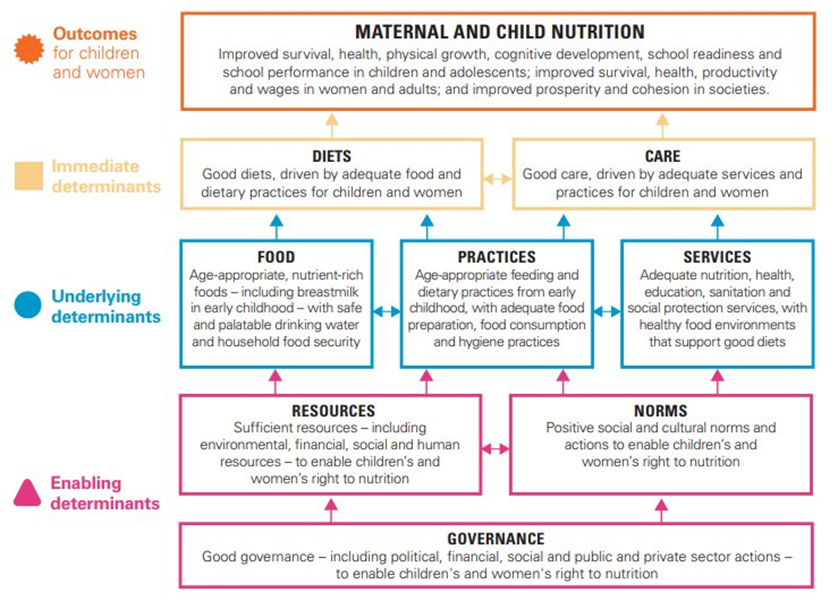
Exhibit: UNICEF
IFNA projects in each country
Madagascar "Food and Nutrition Improvement Project" (March 2019 - June 2024)
In Madagascar, the stunting rate of children under 5 years old is the fifth highest in the world at 49%, and malnutrition is a serious issue. This project aims to improve the nutritional status of women and children by strengthening multi-sectoral coordination functions and promoting behavioral change among residents in three provinces in the central highlands, where stunting is particularly serious.
Nigeria "Improving Nutritional Capacity in the Federal Capital Territory Project" (January 2019 - November 2024)
In Nigeria, chronic or acute malnutrition among children under 5 years of age is severe, posing challenges regarding the nutritional status of the population. This project aims to implement an effective approach to improve nutrition through food, through two approaches: "target group intervention" and "whole community intervention".
Kenya "Strengthening Climate Change Adaptation through Improved Food and Nutrition in Arid and Semi-Arid Regions Project" (February 2022 - January 2027)
Arid and semi-arid areas unsuitable for agriculture account for 80% of Kenya's total land area, and in recent years, climate change has caused chronic food and water shortages. This project aims to improve household food and nutrition in Turkana and Kitui counties, where malnutrition is particularly severe, through vegetable feeding activities, learning about vegetable cultivation through homework assignments, and grass cultivation activities in settled areas.
Burkina Faso "Nutrition Improvement through Agriculture Project" (February 2021 - February 2027)
Burkina Faso is facing serious problems of widespread poverty due to repeated political upheavals and crises, as well as unemployment and food crises caused by population growth and climate change. This project aims to improve the nutrition of the population by improving the agricultural income of the parents of school children (farmers) using the SHEP approach.
Ethiopia "Nutrition-Sensitive Agriculture Model Village Development Project" (August 2022 - August 2025)
Ethiopia is facing an economic slowdown due to high malnutrition rates. This project aims to establish a model village for nutrition-sensitive agriculture.
Rwanda, "Sectoral Policy Loan to Improve Nutrition through Agricultural Transformation" (February 2019 - September 2021)
Through policy dialogue and financial support, guidelines for nutrition mainstreaming in the agricultural sector were developed and guidance was provided for the production of high nutrient value crops.
- Signing of Yen Loan Agreement (August 19, 2019)
Issue-specific and regional training
Knowledge Co-Creation Program
The Knowledge Co-Creation Program (KCCP) for Nutrition is a 3-week training program in which officials from nutrition-related ministries in each country come to Japan to learn knowledge and practical methods for planning, implementing, and managing multi-sectoral nutrition improvement programs. The participants prepare an action plan at the end of the program.
- Improving Nutrition through Agriculture (English and French speaking countries) (FY 2017 - FY 2021)
- South Asia Multi-sectoral nutrition improvement (World Bank collaboration) (FY2021-FY2024)
- Multi-sectoral efforts to improve nutrition through food (English and French speaking countries) (FY2022-)
Regional Training
The regional training, conducted in collaboration with the Regional Economic Communities (RECs) under the AU, is a three-day training program designed to deepen the understanding of nutrition-sensitive agriculture among officials of nutrition-related ministries in each country.
- 1st Regional Training (Economic Community of Central African States ECCAS) (March 2023)
- 2nd Regional Training (East African Community EAC) (October 2023)
- 3rd regional training (Southern African Development Community, SADC) (August 2024)
Cooperation Tools
NFA Application
The NFA App is a web application tool jointly developed by the African Union Development Agency (AUDA-NEPAD) and JICA.
Based on the dietary guidelines, the program will visualize nutrition gaps in the target communities and make recommendations for improving access to healthy diets. Based on field trials in Ghana, Senegal, Zambia, and Malawi, the application is in the final development phase.
The following 3 functions of the App can help promote healthy eating through improved food access.
- Function 1: Visualize and assess the residents’ daily diet and identify nutrient gaps.
- Function 2: Identify the food access of the target population based on their crop calendar and socioeconomic background.
- Function 3: Make recommendataion for healthy diet intake.
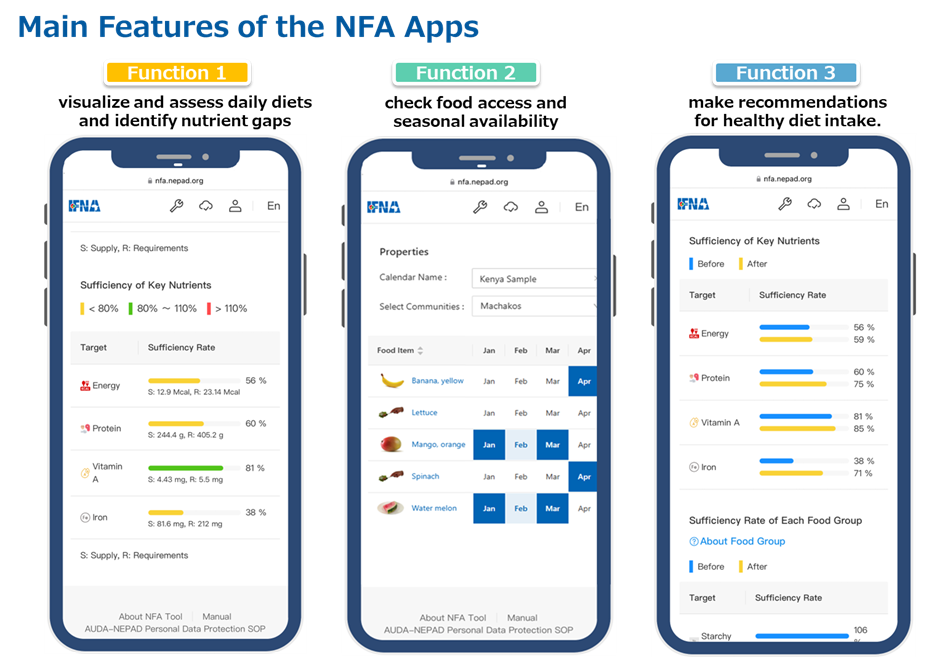
Food Tracking Tool
An educational tool to promote dietary improvement by visualizing deficient nutrients.
Prepared by Madagascar Project for Improving Food and Nutrition
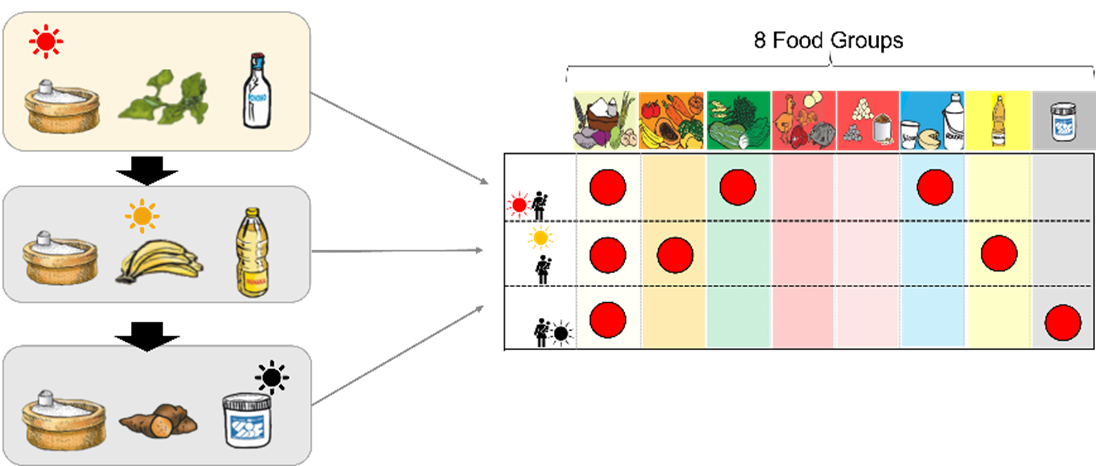
"Shopping Sugoroku" game (parlor game)
An educational game to help people learn to "choose and buy within their budget" and engage in appropriate consumption activities, prepared by Japan Overseas Cooperation Volunteers (JOCVs)
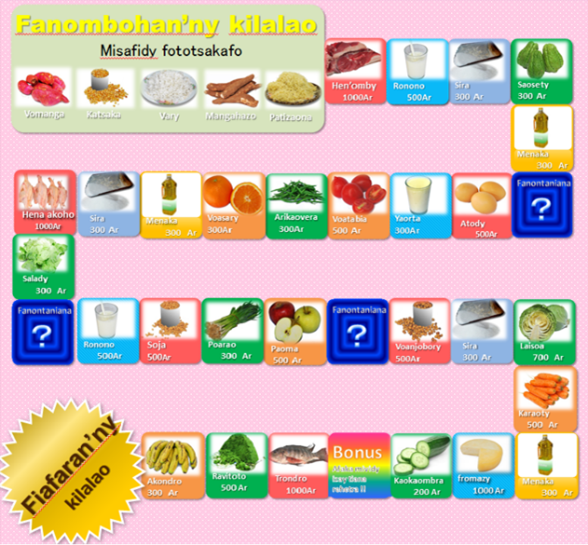




scroll